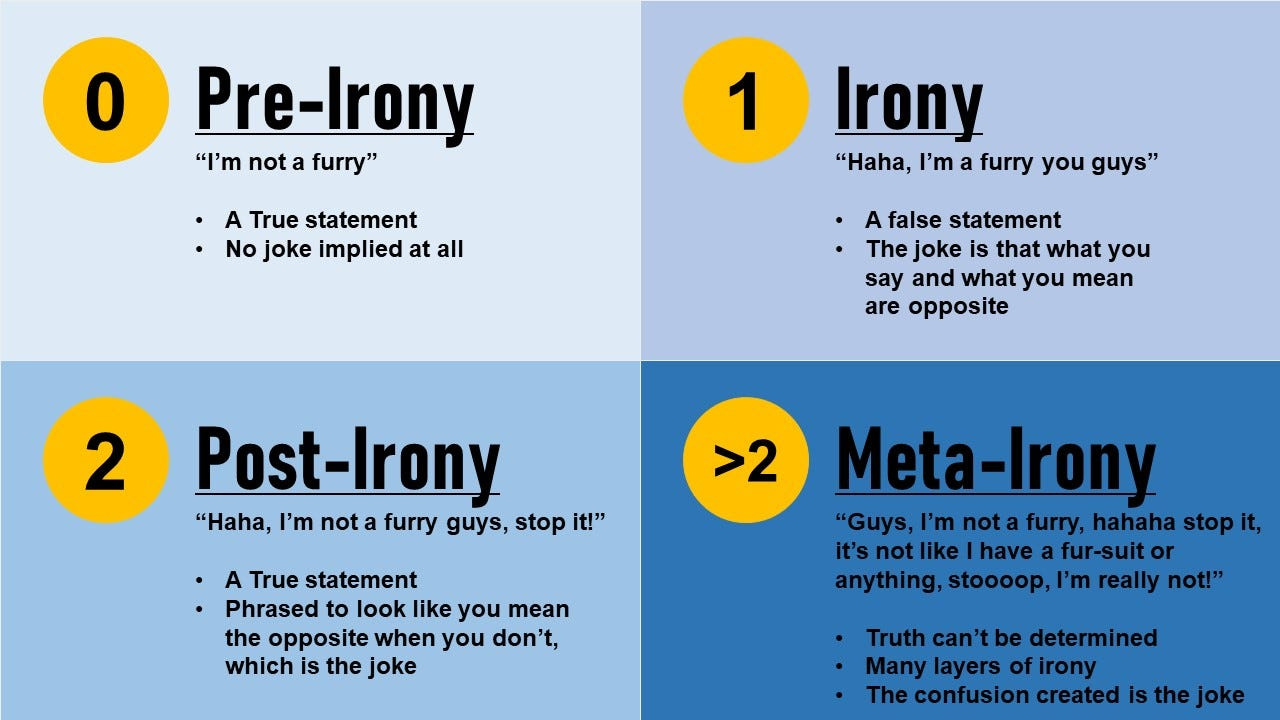My claim is not that the difference between sincerity and irony is illusory because they involve doing the same thing; the illusion is in thinking that there is a permanent, coherent, and causal “you” that does things, so the difference between being sincere and ironic is purely one of self-perception (illusion).
When people are being sincere, they do what reflects their thoughts and emotional state. Getting mad when the sports team loses. Claiming to enjoy foods that you enjoy. This opens people up to being vulnerable, being attacked for things that are linked to their identity. So people have started being ironic: doing things that do not reflect the self.
My uncle1 gifted me a pair of Gucci sneakers when I was 12, which fit me by the time I was 13. I thought that luxury brands were for dull and showy people, so I did what any teenager would do: I wore them ironically; they were nice shoes after all. But I can’t even wear them ironically anymore because the idea of “me” doing things has been deconstructed. My brain does things, my hands move, and suddenly the shoes are on my feet. “I” didn’t put the shoes on, officer.
The passage of time has led to the emergence of two new states: postirony and metairony. Postirony advances sincere messages through the vehicle of irony, i.e. a postironic welfare reformist arguing “hey, wouldn’t it just be awesome if the government just let homeless people starve on the street?”, instead of ironically arguing “wouldn’t it be awful if homeless people just all starved?”. The stage of irony and sincerity being blurred due to postironists has been dubbed “metairony”.
The frame of irony assumes that there is a coherent and causal (not necessarily permanent) I that does things when it does not. The same is true for thoughts: people don’t choose to have songs stuck in their head or immediate strokes of genius, they merely appear. Although I object to the idea that the consciousness itself is nonexistent, people’s decision to identify with it is unfounded and arbitrary. It’s also more accurately described as the department of the brain that attempts to construct socially safe narratives as to why things occur: “I cheated on my wife because of a lack of will, not love”.
I am told that modern science has largely validated this perspective, with studies finding that brain activity precedes conscious action and that the brain is a collection of modules that carry out distinct tasks, but I can’t say that I stand behind it with any confidence; I have no interest in neuroscience.
In this post, I use the word ‘I’ and make causal statements about my own beliefs and actions. This appears contradictory, but the structure of grammar forces me to do it. In conventional English grammar, a sentence needs to have a subject which does things to something, so we must say things like “I think chess is boring” which makes us believe “we” generate our thoughts, when they’re just things that appear in our heads that we irrationally attach ourselves to. It’s also much faster and clearer to say “I think X” instead of “the network of neurons stored inside the cranium that inhabits the body that is communicating this message has generated thought X”.
Irony gives the ironist the same detachment that spiritual progression does, but at the cost of the soul: the capacity to do things that are reflective of the body’s drives. Consistent ironic action is eventually done reflexively: I once started calling my parents “mother” and “father” ironically, and now do it automatically. There is no evolutionary pipeline that allows us to sort between things we do “sincerely” and “ironically”; it feels the same way to our physiology.
Irony has also been judged in the context of narrative, beyond real life application. In that respect, I am an unashamed, unsophisticated and total advocate of sincerity. I have no deep, logical reasoning for doing this.
Irony just looks ugly.
Frankly… I can’t say I endorse sincerity either. I’ve seen too many sincere people say or do things they 100% believe in and fail spectacularly because they are mediocrities with no talent who don’t think things through. The ideal to me is not being yourself, being ironic, or faking it till you make it, but doing it till you are it.
Becoming yourself.
I also challenge anybody to live a purely sincere life. It’s not fun. Life is a performance: Starbucks constructed with local wood selling lattes made with Brazilian coffee beans, cousins who lie about eating food, and politicians who wear J.Crew but prefer and could afford to wear Louis Vuitton. The ironist embraces this, while the sincerist foolishly rebels.
Sincerity also encourages conformity — if you can’t appear as X and be Y, then you have to be X or risk punishment Z. It’s not a fun game to play. Irony games do eventually get unmasked: ironic racism is as obvious as sincere racism (Hanania seems to have figured out the next step is ironic antiracism).
Irony is overhated and gets blamed for things that it isn’t responsible for. “Hey guys, I believe in nothing and want to seem detached from everything so I am going to go buy a gun, go outside, and kill a bunch of people” — said nobody ever. The influencer push to blame the Charlie Kirk shooting on “irony poisoning” and “terminally online nihilists” was a rather bizarre misdirection from the true culprit: the radical left. Irony and nihilism are sedatives, things that draw people away from grand narratives, religions, or creations. Perhaps this is for the better.
He is gay, for all the evolutionary biology enjoyers.





You would enjoy reading what Hans George Moller has to say about 'profilicity' – which goes beyond sincerity or authenticity.
He presents a a description of the applied version of the Zuangzhi philosophy: in which we are all genuinely pretending to exist across different contexts and platforms.
https://cup.columbia.edu/book/you-and-your-profile/9780231551595/
https://cup.columbia.edu/book/genuine-pretending/9780231545266/